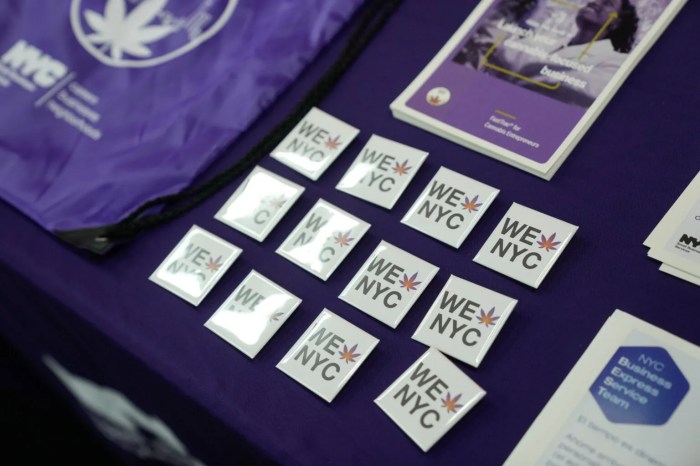
Mayor Bill de Blasio had some unambiguously happy new year news to share on Wednesday: Reported crime was down four percent year over year.
Some of the drops were sizable — including for shootings, which were at lowest level in the modern era of CompStat.
That’s the kind of thing mayors tend to crow about even when they’re not staring down an election year; even if their election didn’t spark a tide of conservative criticism from people nervous about a return to the bad old days under his liberal watch.
Those days haven’t returned — instead, they’ve receded farther into the past.
To underscore the point, a display of photos at the mayor’s announcement at the Brooklyn Museum featured the old New York — complete with “Crack Heads U. R. Dead” and “Brighton Beach Boys After You” graffiti — for “perspective,” said de Blasio, on how far the city had come.
Low crime is good news for the city as well as for de Blasio’s political fortunes. But in New York’s political landscape, where the NYPD is always a pressure point, will the goodwill the numbers bring be enough?
What policing looks like in de Blasio’s New York
In his first campaign, de Blasio challenged the idea that crimefighting depended on stop-and-frisk, the controversial policing tactic mostly consisting of bullying minority New Yorkers with little constitutional cause. He was proven right: A dramatic decrease in stops that began under his predecessor and continued on his watch didn’t result in the apocalypse.
But de Blasio went along with the status quo on quality-of-life policing, which focuses on low-level crimes. He praised the NYPD yesterday for that and the CompStat, data-focused crime-fighting revolution begun by his former police commissioner William Bratton.
Today that revolution has evolved into “precision policing,” which the NYPD bills as a hyper-focused allocation of resources to the places where crime happens. It’s the difference between just chasing down a gun that killed somebody and investigating a shots-fired report where nobody was hurt to prevent another shooting.
“You treat the person with a gun essentially as a shooter who hasn’t shot somebody yet,” Deputy Commisioner of Operations Dermot Shea said in an interview.
Policing always comes back to politics
The other piece of the puzzle, according to de Blasio and his new police commissioner James O’Neill, is “neighborhood policing,” a program where certain officers walk a regular beat and are tasked with working as problem solvers rather than simply responding to 911 calls. The idea is to get police to know communities better and vice versa.
Shea said it’s too early to tell rigorously if the program is statistically reducing crime. But the NYPD and de Blasio appear to be hopeful about it and other similar strategies: the mayor said boldly “We expect crime to go down further.”
For some critics, the dog and pony show about dropping crime rates might as well have been from a different world, focused on the raw numbers and not some of the fallout of police actions.
The news conference had hardly ended when a group of criminal justice reform organizations blasted out their condescension: Constance Malcolm, whose son Ramarley Graham was killed by police in 2012, asked why de Blasio’s NYPD wasn’t holding some officers accountable for actions like those of the officer who shot Graham.
Legal Aid attorney Tina Luongo questioned what she called the de Blasio administration’s “discriminatory policing.”
Bob Gangi, director of the Police Reform Organizing Project, or PROP, pointed to the many factors that go into crime rates in urban centers like New York beyond policing — changing levels of poverty, investment, and education, for example.
“The city is unquestionably much safer than it was 20 years ago,” Gangi said by phone. “What’s not open to question: Broken Windows policing is a racist form of policing,” he said, referring to the high number of minority New Yorkers arrested for low-level crimes. That label doesn’t change, Gangi said, even if you think that kind of policing led to the crime drops.
He and others from PROP are “seriously considering” a protest candidacy against de Blasio in the Democratic primary due to “frustration with getting the message out.”
That frustration is similar to the anti-stop-and-frisk fervor that propelled de Blasio’s first campaign. In his second, he’ll be asked where’s the reform along with the low crime.

















